Heads up! Who was Ralph Bunche (1903-1971), and why do not you know? You do not know, now do you. Shame!
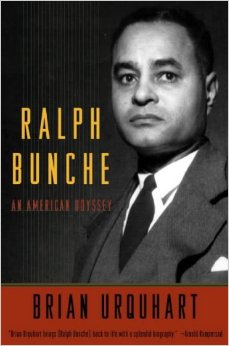
A few hints then. He was point guard on three conference championship basketball teams at UCLA. [Sounds of silence.] This was a minor part of his odyssey.
Another hint. He had a Harvard PhD in political science.
No, still nothing.
How about the fact that he got a Nobel Peace Prize, and in his case, unlike several other recent recipients, it was deserved.
A last try, he served in the OSS during World War II. Huh? I hear the thinking. Look it up, Mortimer.
Let’s get the cat out of the bag. He was Dag Hammarskjöld’s right hand at the United Nations where he worked from 1944 to 1970. In fact, his tenure preceded Hammarskjöld’s and, of course, he outlived the Swede.
Oh, and he was an American Negro (the term he always used). That bespeaks the odyssey. His grandparents were born in the slave society of Missouri.
It was an article of faith from those grandparents onward on both side of the family tree that a black had to be educated to survive in the white man’s world.
Born in a Detroit before it became the manufacturing capital of the United States, his family moved to Albuquerque, New Mexico in the early 1915. Tuberculous was suspected in some family members and they packed off for the dry climate with a few dollars and strong wills to make a living. His mother and grandmother combined to insure that he got an education. When his school work was poor they complained to the school, where the principal rather thought they should be grateful that the school even took in a negro.
He was a bored student in high school, these two decided, because the school had slated him for vocational classes, woodwork, typing, auto shop, book-keeping. They more or less sat in the principal’s office until Bunche was put into the academic track of college preparation. They then applied themselves to making sure Ralph lived up to the challenge, and he did.
He encountered racism but only small doses in the sparsely populated New Mexico. The family moved to Los Angeles, as so many others had, to find the land of milk and honey, after the arid dust of the south west. He graduated from high school first in his class but was not recognised as such. Figure it out!
Yes, he played sports as boys do, and got a scholarship to play basketball at Cal.
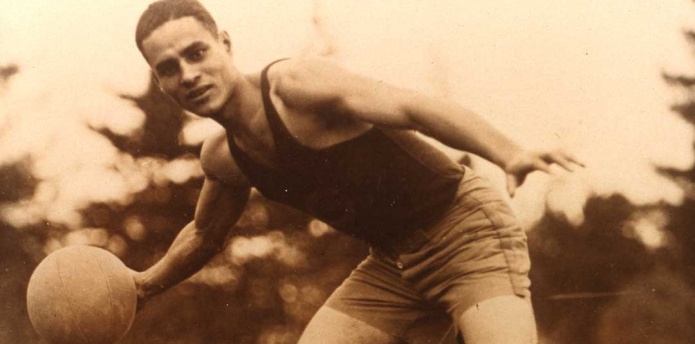 Sportsman.
Sportsman.
Like many others he combined the gym with the library.
He was first in his class again but not honoured as such…because? See if you can guess. The school did not want a black face at the podium with all those benefactors and check books present.
The BA was not enough. He did the one true major, political science. His undergraduate supervisor encouraged him to do graduate work and he went to Harvard, first for an MA, and then a PhD. Along the way he had many part time jobs as students do, and each time he did his best to do them well. He knew that there was no margin of error for a black man.
The PhD made the man for he studied European colonialism. To do that his supervisor insisted he learn languages, French and German. His supervisor also secured funding for him to do fieldwork in European archives and in west Africa. Young, energetic, idealistic, and black he examined French colonialism in west African colonies some of which had been German. What impressed most him the most in his contemporary letters was the alcohol that French colonial officials put away. Second, was how sloppy the records in the archives in Paris were. Third, he found virtually no racism directed at himself in Paris, Dahomey, or Togo. At the time, he took it for granted but in latter life mused on the two-speeds of racism.
Howard University in Washington, D.C., a black college, created a political science department and appointed him the foundation professor and head of department while he was completing the PhD research. He was appointed ABD!
ABD? I was appointed ABD at Sydney. These days few people would be appointed ABD. ABD? All but dissertation. It means that a graduate student has completed all the requirement for the PhD but has not yet submitted the dissertation and had it accepted.
After a master degree with a thesis, the PhD requirements would include three years of advanced seminar work with many essays and research projects, then general written examinations (in three fields), and oral examinations over the generals. It would also include the preparation, defence in writing and oral tests of a proposal for the PhD dissertation. It is heavy lifting. But the heaviest lift is to come in the dissertation which takes about two more years.
But there are many stops along the way from ABD to completing the dissertation. ABD forms a continuum. At one end is as above, at the other is someone who completed all the research, written the dissertation and had it examined and passed, but the degree has not yet been awarded due to the cycle of the university.
To cut to the chase, many, many ABDs do not become PhDs. They do not complete that final requirement, the dissertation and defend it. Of these most just do not finish; only a few finish the dissertation but fail the final defence, though I have seen it happen twice in my forty years at the table.
There are as many reasons why ABDs do not finish as there are ABDs. Life intrudes, the fellowship runs out and a living has to be earned. Pregnancy alters priorities. It proves hard to conceive, execute, and write a book in the two years.
While ABD Ralph Bunche had his share of problems. His duties at Howard were demanding. and while the pay was adequate there was nothing left for more field-trips, to pay for professional typing, conference travel, or translations. But somehow, thanks largely to his long suffering wife, Ruth, he did it. In sum, he had all the problems any ABD had, and each was overlaid by the racism of the time and place. e. g., getting access to the Library of Congress was a struggle for a black man.
He got another fellowship for archival research, this time at the Colonial and Foreign Office in London and during this period he met a long list of others like Paul Robson, many of them communists to a degree, as the only recourse for black hopes. He found himself at home in this worldly milieu, but argued constantly against the communist line. He agreed that class incorporates race and was the origin of much racially suspicion, fear, and hostility in the white working class and lumpenproletariat, but he had no use for the Communist Party as an agent of change for the better. Of course merely talking to such believers made him a fellow traveller to the likes of Hoover J. Edgar. During this period, 1937-1938, he made an extensive field-trip to East Africa, including Kenya, where he made many contacts thanks to his London friend, Jomo Kenyatta.
When lights went out all over Europe again, the War Department began serous recruiting, and it wanted an African specialist, especially French North Africa. Bunche was recruited to work in that very same Library of Congress. Cognoscenti will know that the OSS was housed there initially because Colonel William Donovan wanted his agents to have a thorough grounding in culture, history, and languages. Yes, Bunche became a desk officer for the Office of Special Services, the parent of the CIA. He wrote manuals and training programs that were eventually used by American forces in Operation Torch, the landings in Morocco and Algeria.
He also attended at least one of the Roosevelt-Churchill summits which addressed the post-war world. President Roosevelt wanted planning for the post-war world to start from day one of the war, or before, and it was in fact before, because he had seen the aftermath of World War I descend into comedy, farce, and now tragedy.
When the idea of a new League of Nations to keep the peace emerged, the State Department wrenched Bunche from the OSS and put him to work on the future of colonial places and peoples. Bunche had become the United States expert on European colonies. He attended the San Francisco foundation of the United Nations on the American delegation, where he soon became the United Nations expert on colonies.
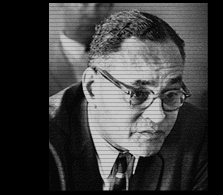 Mediator.
Mediator.
He also worked closely with Eleanor Roosevelt on the Universal Declaration of Human Rights.
He was a master of the research, also he proved adept at finding small steps of common ground in committee meetings and negotiations. Trygve Lie, the first Secretary General found Bunche was someone who could do the near impossible, and so assigned him to Count Folke Bernadotte, that ill-fated descendent of Napoleon’s wayward marshal, to mediate the Israel partition. The telling of this is a major part of the book, just under one hundred pages, and it proved to be Bunche blooding as an international civil servant, literally and figuratively.
For the ordini, in contrast to the cognoscenti, the Count was murdered in the street, in an open car in Jerusalem wearing a white Red Cross uniform by terrorists who wanted to disrupt all negotiations and drive the fledgling United Nations out. These terrorists — the Stern Gang — included a future prime minister of Israel.
Bunche was catapulted on the spot into the top job as the UN mediator.
There follows a story, familiar today, of intransigence and hostility from Israeli Jews and from Arabs of all stripes. He had remarkable stamina and patience, perhaps born of his own personal experience of enduring the unendurable as a black man, and he kept at it. The key point is simple.
After the murder of Bernadotte all negotiations took place on the island of Rhodes. There the Israel delegation and that of Egypt, the first of the Arab states at the table, stayed in the same hotel, ate in the same dining room, and played on the same ping-pong and billiard tables. There was much posturing, partly, mainly for domestic consumption and then painful deliberations in search of the undiscovered country of common ground. After weeks, there was an agreement for peace, and instead of returning to headquarters to take a bow, Bunche went on negotiate similar agreements with other Arab states, Trans-Jordan, Syria, Lebanon, and Iraq. The first agreement made the second easier to secure, and the second made the third easier and so on.
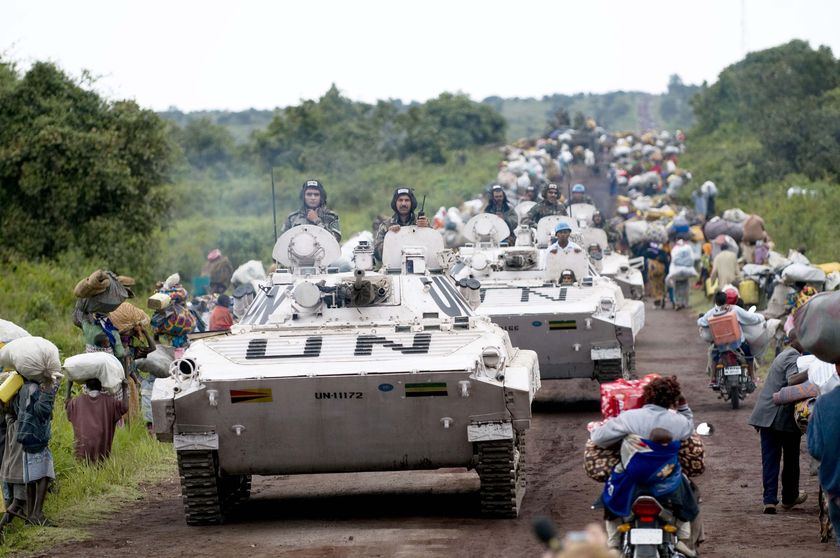
His approach reminded me a little of MacKenzie King in his days as a mediator. He got the antagonists talking about indirect matters, the size of the table, the menu, all the trivia and as they agreed on these things he went on to other minor points….one after another building up agreement. No agreement was too small because each agreement made the next one easier.
For his labor to end the Arab-Israeli War the Nobel Peace Prize committee recognised him in 1950. He copied much of Bernadotte’s approach, but the substance was his alone. Indeed Bernadotte’s approach was partly his downfall. He was transparent and punctual. He always told everyone what he doing and when he was doing it, and stuck to a rigid timetable. His meetings and travels was published the day before and he was never late for a meeting. Bernadotte also thought the white uniform was protection enough and had no body guards. The murderers had no trouble locating him.
In the lead-up to his murder the extremists in Israel had portrayed Bernadotte as evil incarnate and an anti-semite from the cradle. Think Fox News on Hillary Clinton. The truth is that during World War II as a Swedish Red Cross official Bernadotte had risked his life and limb more than once to extricate people from the Nazis, including many Jews, some later resident in Israel, and also from the Soviets. He survived unlike his colleague and compatriot Raoul Wallenberg.
The burden of racism never ended. On the ocean liner to Oslo to receive the prize he was harangued by a woman at dinner about the inferiority of negroes, she being blind drunk and too vain to wear glasses, did not realise he was a negro, until he told her. But things only got worse.
He was targeted by the House UnAmerican Activities Committee. The ostensible cause was that he attended a meeting in 1935 where a self-proclaimed Communist had spoken. The proximate cause was that Alger Hiss had appointed him to the San Francisco delegation to set up the United Nations, and anyone Hiss touched was poisoned in a reverse King Midas.
The accusations were puffed up by the some of the in(per)formers on Roy Cohn’s payroll. Shades of Fox News. The lies were so false that they were hard to refute, but nonetheless Bunche spent two weeks on written replies to fourteen accusations, searching attics, storage trunks, carbon copies, and the like to reconstruct his activities and correspondence fifteen years earlier. The investigation lapsed, but as was the way with these witch hunts, he was never cleared, though nothing incriminating was ever found. The absence of evidence was not evidence of absence.
That he had opposed Communists in the black organisations he had participated in was proof to the conspiracy theorists that he was a secret Red Agent doing so as cover. There is no win available in this cosmology.
Accordingly, accusations against him circulated among the loony right for another generation. No doubt still do in those circles. He was successful; he was black; and he was a United Nations official. These are three things loons hate. These were his crimes. To be born. Guilty. To succeed. Guilty. To serve humanity. Guilty. Why is it that I think of Fox News.
In those days the loons did not own the Republican Party and President Eisenhower demonstrated publicly his confidence in Bunche more than once, while Harold Stassen, the eternal pretender, who had worked with him in San Francisco arranged for him to receive an honorary degree from Penn.
Bunche spoke far and wide about the United Nations, and often emphasised its importance for American negroes as an international conscience. This exposure riled up the rabid right in the States.
Dag Hammarskjōld’s had been appointed Secretary General and after a period of getting acquainted, they worked together as hand and glove, vine and fence. The rule was that no citizen of a member of the Security Council could be Secretary General, ergo Bunche was never a possibility for that job.
The peace he had brokered in the Middle East collapsed a decade later in 1956 when in one of the last spasms of empire, Britain and France invaded Egypt to seize the Suez Canal, while just by coincidence Israel attacked to secure disputed territory around the Gaza Strip, which is still disputed in 2016, sixty years later. Though Bunche tried to intervene, the toothpaste was out of the tube.
In the aftermath of Suez Bunche created the United Nations peacekeeping force. There had been UN observers before but these peace keepers were supposed to keep the antagonists apart, not just report on what happened. The practice of painting vehicles white set by Bernadotte was continued. While no international uniforms were created the blue hats were used to identify the UN troops, first war surplus USA helmet liners painted sky blue, the berets came later. That was the first demand for the supply of peace keeping troops that created the market which exists today, wherein cash strapped Third World countries sell their soldiers to the UN.
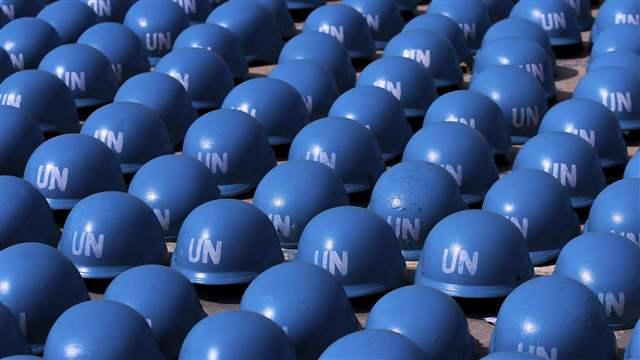 More than 3,000 UN peacekeepers from 120 countries have been killed on duty as of 2016.
More than 3,000 UN peacekeepers from 120 countries have been killed on duty as of 2016.
His home life was sacrificed to his travels and to the enormous pressures on him. Though when in New York he had something akin to a normal life for weeks at a time. He and Ruth bought a house in Queens where she lived until her death in 1988. Bunche, by the way, was a heavy smoker but drank alcohol only socially and not always then, apart from the toasts.
Then came the Congo and that just about destroyed the United Nations. When Hammarskjöld was killed, Bunche was once again catapulted into the top job on the spot. Once again in this telling, Belgium earnt the reputation as the worst of the colonisers. The Congo was the biggest in a relentless flow of crises: Yemen, Kashmir, Cyprus, Somali, Namibia, Bahrain, Biafra, Vietnam, and always the Middle East, just to cite the headlines. In addition there is a crisis a day within the United Nations itself as the Soviets undermined it, the non-aligned movement discredited it, and the United States suspected it. Back and forth goes Ralph Bunche.
There is more to his story but perhaps this is enough to whet any appetites out there.
Bunche turned the other cheek many times and he forgave but he did not forget.
Ergo when President Harry Truman offered him the number two job in the State Department, he declined because in Washington D.C. years before when his daughters’ pet dog died it could not be buried in the pet cemetery because the pet cemetery was whites only. Think about that.
When UCLA offered him an honorary doctorate to bask in the glow of his Nobel Prize, he declined it because though he was objectively (by GPA) the best student another had been made class valedictorian. To his credit this other tried to refuse the honour because he knew Bunche had the better GPA.
While on the subject of declines, he also declined Adlai Stevenson in 1951 and Jack Kennedy in 1959 who both asked him to be a foreign affairs advisor at twice the UN salary in their presidential runs. He preferred the UN and New York City. Had he accepted Kennedy, he would likely have become Secretary of State.
When time and tide permitted, he was active in the Civil Rights campaigns.
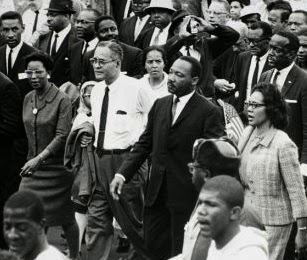 Protestor with Dr King.
Protestor with Dr King.
Another nail in coffin prepared by Hoover J. Edgar.
Brian Urquhart was a long-time British diplomat at the United Nations.
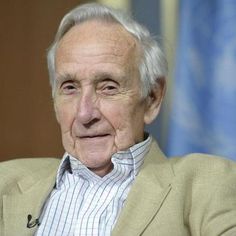
Much of the book is a record of events in which Bunche participated from which the readers learns little about the man himself. How he could summon the energy and good will to attend one crisis after another remains a mystery, because it became painfully apparent after the Congo that the United Nations could do little. Still little is better than nothing.
Reading about Bunche’s experience as a negro reminded me that once leaving the Hasting Public Library one cold day, in say 1962, I walked out the door and along the sidewalk with a library patron I had often seen there. I was in high school and he was a mature man, with a frosted lens in his eye glasses that implied the loss of an eye. He was old enough to have been in World War II. He was always clean and tidy.
We had seen each other often in the library but never spoken.
That day he did talk to me briefly. While I do recall, and I just tried to retrieve the data from memory Alpha, what precipitated his comments, but I do remember his comments, which were to the effect that every negro in Hastings received communist propaganda. It was said in such a way as to imply that they were receiving it because they were communist themselves. It left me speechless and he walked on as I turned off. That would be all six of them.
Recalling that incident now reminds me that in a way, some of what I became traces back to one of the blacks. In junior English class in high school, one of the students was Sam Mullins, who was slow on the uptake but genial, and once as we walked out of class, he asked me about my plans for going to college. I was surprised, too immature myself to have thought that far ahead at the time, and I said I probably would not go, and he scoffed and said I should. He and I were not buddies but it was one of the first times I was prompted to think about the future like that. Other prompts came later, some institutional, and some personal, but that was the first.
(The teacher was a very short woman who always told us the answer before asking the question, so anyone listening, albeit a minority, could answer. We read Stephen Crane’s ‘Red Badge of Courage’ in that class. That has stayed with me. That seemed then to be a book she placed special emphasis on.)
Skip to content
